 Image search results - "oyama" Image search results - "oyama" |

Ainokura can be reached by bus from Shirakawa-go in Gifu Prefecture. Some scenery along the way by bus to Ainokura.
|
|

Toyama Castle 富山城
|
|
|
|

Looks like Suganuma, another village in Gokayama area.
|
|

Reconstructed in 1954, modeled after Hikone and Inuyama Castles. Renovated in Nov. 2005.
|
|
|
|

Entry road to Ainokura village. Bus stop shelter on right.
|
|

Toyama Castle
|
|

Way to Ainokura, one of the gasshou-zukuri villages in the Gokayama region designated as a World Heritage Site. Ainokura has over 20 houses with steep thatched-roof houses amid high mountains. Ainokura is also a National Important Traditional Townscape Preservation District (重要伝統的建造物群保存地区).
|
|
|

What you see first is a big parking lot for tour buses. Then you see the hordes of tourists.
|
|
|

Ainokura monument
|
|
|

View of Ainokura which is also a National Important Traditional Townscape Preservation District (重要伝統的建造物群保存地区).
|
|
|

One of Japan's three Big Buddhas (after Nara and Kamakura). The statue was built by local coppersmiths in 1932, taking 30 years to complete.
|
|

Road to Mt. Yukinoyama, an ancient mountain and home to over 200 tumuli built during the 5th to 7th centuries. In 2013, it was designated as a National Historic Site.
|
|

JR Takaoka Station (north side) 高岡駅
|
|

View of Ainokura from a hill
|
|
|

The Takaoka Daibutsu stands 15.85 meters high, weighing 65 tons. Japan's largest copper statue. Takaoka, Toyama
|
|

Approaching Kawamori. 川守
|
|

Inside Takaoka Station passage
|
|
|
|

Kawamori bus stop, nearest to Mt. Yukinoyama.
|
|

In front of JR Takaoka Station (north side)
|
|

In fall 2007, it underwent major renovation.
|
|
|

Bird's eye view of Ainokura 相倉展望台
|
|

To Mt. Yukinoyama
|
|

Sculpture in front of Takaoka Station (north side)
|
|
|
|
|
|
|

Sculpture in front of Takaoka Station (north side)
|
|

Ainokura
|
|
|
|

JR Takaoka Station (south side)
|
|
|
|

Castle tower (local history museum) admission is 210 yen. 富山市郷土博物館
|
|

Mt. Yukinoyama and Hino River 雪野山と日野川
|
|

Shopping street near Takaoka Station
|
|
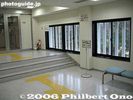
Inside Toyama Castle tower
|
|
|

Mt. Yukinoyama and Hino River 雪野山と日野川
|
|

Sculpture along a shopping street
|
|

Ainokura
|
|
|

Hino River 日野川
|
|

Ainokura is smaller than Shirakawa-go, but still tourist-driven.
|
|
|
|

Hino River 日野川
|
|
|
|

Main entrance to Aoyama Cemetery during cherry blossom season in early April. Gaienmae Station (Ginza/Hanzomon Line) and Nogizaka Station (Chiyoda Line) are the closest subway stations.
|
|
|
|
|

Mt. Yukinoyama and Ryuoji Temple. MAP
|
|

Aoyama Cemetery office near the main entrance where you can obtain a map of the cemetery and ask where particular people are buried. The maps they provide do not show where the most famous people are (such as prime ministers).
|
|
|
|

Main thoroughfare, lined with cherry trees, cuts through the middle of the cemetery where cars whiz by. Quite irritating.
|
|

Ryuoji Temple 龍王寺
|
|
|
|

Cherry blossom tunnel at Aoyama Cemetery.
|
|

Ryuoji Temple 龍王寺
|
|

Center of Ainokura and souvenir shop.
|
|

Top floor of castle tower
|
|
|
|

Aoyama Cemetery is one of Tokyo's noted spots for cherry blossoms. However, having hanami picnics is not allowed.
|
|

Cherry blossoms are so fleeting. They last for only a short time, like life itself. And so cherry blossoms are often found at cemetaries in Japan.
|
|
|

These trees stood out.
|
|
|
|

Cherry blossoms and graves.
|
|

Ryuoji Temple belongs to the Tendai Sect. 龍王寺
|
|

Aoyama Cemetery map. Quite complicated system to find grave plots.
|
|

Thatched roofs
|
|

Balcony of Toyama Castle tower
|
|

Ryuoji Temple 龍王寺
|
|

Signs tell you where you are. Quite bewildering mapping system.
|
|
|

Ainenji temple 相念寺
|
|

Tenjin Shrine 天神社
|
|

Aoyama Cemetery has over 123,000 graves occupying 125,000 square meters within the cemetery land area of 263,564 sq. meters.
|
|

View from Toyama Castle tower
|
|

These pictures were taken in the fall.
|
|

Tenjin Shrine, reconstructing the shrine. Ryuo-cho, Shiga. 天神社
|
|

This is the Foreigner's Cemetery where many foreigners who helped to modernize Japan are buried.
|
|
|
|

Hiking trail on Mt. Yukinoyama.
|
|

A monument erected in March 2007 by Tokyo Governor Ishihara Shintaro in appreciation of the foreigners who helped build Japan.
|
|
|

Spare thatch, Ainokura
|
|

Steps up to the top of Mt. Sasaoyama.
|
|

Mountain God Memorial 山の神
|
|

List of foreigners buried in this Foreigner's Cemetery. Note that there also other foreigners buried in other parts of Aoyama Cemetery.
|
|
|

Center of Ainokura
|
|

Lookout deck on Mt. Sasao. 笹尾山
|
|

Trail flanked by ferns
|
|

Foreigner's Cemetery 外国人墓地
|
|
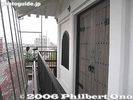
Balcony of Toyama Castle tower
|
|
|

Mt. Sasaoyama and stone marker. 笹尾山
|
|

Ferns
|
|

Foreigner's Cemetery 外国人墓地
|
|
|

Toyama Castle tower
|
|

Mt. Sasaoyama and stone monument marking Ishida Mitsunari's base camp.
|
|

Grave of Edoardo Chiossone (1833-1898), an Italian who introduced printing technology (for money and stamps) to Japan. He loved Japan and amassed a huge collection of Japanese art, especially woodblock prints. The collection is donated to a Genova museum.
|
|

Monument in the center of Ainokura.
|
|
|

1st lookout point, too many trees in the way.
|
|

Gravestone of Edoardo Chiossone
|
|
|
|
|

View from Yukinoyama
|
|

Grave of Joseph Heco who was born Japanese (as Hamada Hikozo) but naturalized as a US citizen.
|
|

Gassho Storehouse 合掌小屋造り
|
|
|

Top of Mt. Sasaoyama
|
|

View of Ryuo-cho town from Mt. Yukinoyama.
|
|

Grave of Joseph Heco
|
|
|
|
|

Top of Mt. Sasaoyama and stone monument
|
|

Map of hiking trails on Yukinoyama. It takes about 90-120 min. to go up and down the mountain. There are some fine views from the trails.
|
|

2nd lookout point 第二展望台
|
|

Grave of the family of Robert Walker Irwin (1844-1925), Hawaiian Minister to Japan. (Iron gate has since been removed.)
|
|

Restrooms
|
|
|

Graves of the family of Robert Walker Irwin (1844-1925), Hawaiian Minister to Japan.
|
|

Grave of Robert Walker Irwin (1844-1925), Hawaiian Minister to Japan and his Japanese wife Iki. Eldest child Bella Irwin is also buried here.
|
|

Gravestone of Robert Walker Irwin (1844-1925), Hawaiian Minister to Japan and his Japanese wife Iki.
|
|

Grave of Robert Walker Irwin Jr. (Robert Walker Irwin's first son) and his first wife Fusako.
|
|

Grave of Richard Irwin (Robert Walker Irwin's second son) and his son Takeo and daughter Yukiko Irwin.
|
|

Grave of Mary Irwin (Robert Walker Irwin's second daughter).
|
|

Grave of Tsuneko Irwin second wife of Robert Walker Irwin Jr. and her son John.
|
|

Grave of Tsuneko Irwin second wife of Robert Walker Irwin Jr. and her son John.
|
|

This stone monument gives the biography of Robert Walker. His birthdate, descendant of Benjamin Franklin, his move to Japan, companies he worked for in Japan including Mitsui Bussan, supervision of the immigration to Hawaii,founding of the Taiwan Sugar Co., and the decorations he received from the Japanese government. Died in 1925 at age 81.
ロベルト・ウォルカー・アルウインは米国費府
の住民にして西暦千八百四十四年一月七日
に生まれベンジャミン・フランクリンの後裔也
慶應二年十一月来朝し海外貿易又は日本海
運の開発誘導に貢献するところ頗る多く三
井物産会社其他に勤務し後ち日本駐劄布哇
国公使に就任して日本移民の布哇渡航を企
画成功す蓋し之れ日本移民海外発展の基と
なれるものにして実に日本移民事業の開祖
たり明治三十三年台湾製糖株式会社の創立
発起人となり日本糖業の為めに尽くすとこ
ろ又尠なからす勲一等に叙せられ瑞鳳章を
賜ひ後ち又旭日大綬章を賜ふ大正十四年一
月五日永眠す行年八十一才也
|
|

Monument dedicated to Bella, built by the Irwin Gakuen (formerly Gyokusei Gakuen) alumni association (Gyokusei-kai) for the school's 70th anniversary in Nov. 1985.The bottom has a bio of Bella.
|
|

This originally was for grave visitors to leave their business cards, but it does not work. (As of this writing, there is no receptacle to collect the cards.)
|
|

Lookout deck with a bird's eye view of the battlefield.
|
|

Top of Yukinoyama at 308 meters elevation. The views are obstructed by many trees. 雪野山 頂上
|
|

Graves of Robert Walker Irwin (rear, on the right) and his family. (Old photos of the graves.)
|
|

Looks traditional on the outside, but modern on the inside.
|
|
|

Map on lookout deck.
|
|

Top of Yukinoyama. 雪野山 頂上
|
|

Thatched roof and persimmon tree
|
|
|

Sekigahara Battlefield, now occupied mainly by rice paddies, a school, and homes. 関ヶ原古戦場
|
|

View from top of Yukinoyama
|
|
|
|

Sekigahara Battlefield and Mt. Matsuo 関ヶ原古戦場
|
|

View from top of Yukinoyama
|
|

Grave of loyal dog Hachiko and his master, Professor Ueno.
|
|
|
|
|
|

View from top of Yukinoyama
|
|

Grave of Yoshida Shigeru, Japan's first postwar prime minister.
|
|

Fire hydrant
|
|
|
|

View from top of Yukinoyama
|
|

Grave of Yoshida Shigeru 吉田茂の墓
|
|

Ainokura Folk Museum No. 1 南砺市相倉民俗館1号館Exhibits related to life in Ainokura and the gassho-zukuri houses.
|
|
|
|

An unkept grave.
|
|
|

Ainokura Folk Museum No. 1
|
|
|
|
|
|
|

This trail was much more scenic.
|
|
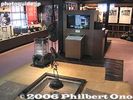
Inside Ainokura Folk Museum No. 1
|
|
|

Toyama Castle
|
|

Ryuo-cho town as seen from Yukinoyama
|
|

Inside Ainokura Folk Museum No. 1
|
|
|

Inside Ainokura Folk Museum No. 1
|
|
|
|

Looking toward Higashi-Omi.
|
|

Roof peg
|
|
|

Water barrels in case of fire.
|
|
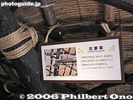
Gassho hari
|
|

Trail going down the middle of the mountain.
|
|
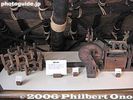
Silk-making implements
|
|

View of central Ryuo-cho town from Mt. Yukinoyama.
|
|
|
|
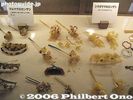
Hair pins
|
|

Ferns
|
|

Snow coat made of straw.
|
|

Ferns all over
|
|

Snow outfit
|
|
|
|
|
|
|

Lookout point
|
|
|
|

Spare thatch
|
|
|
|
|
|

Left side was recently reroofed.
|
|

Sky over Ryuo-cho town
|
|

Ainokura Folk Museum No. 2 南砺市相倉民俗館2号館Exhibits related to the traditional industries of Ainokura such as gunpowder manufacturing and washi paper making.
|
|

Entrance to an ancient tumulus (No entry)
|
|

Inside Ainokura Folk Museum No. 2
|
|
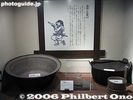
Implements for making gunpowder used in matchlock guns.
|
|
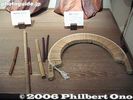
Traditional musical instruments.
|
|
|
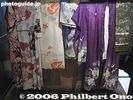
Kimono
|
|
|
|
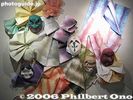
Washi paper
|
|
|

Shrine
|
|

Shrine torii
|
|

Shrine
|
|
|

Monument commemorating the marriage of Crown Prince Hiro (right) and birth of Princess Aiko (left)
|
|
|
|
|

Souvenir of Ainokura
|
|

Road sign showing way to Ainokura.
|
|
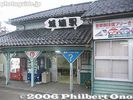
Johana Station
|
|

Entrance to Ariake Colosseum for the game between Tokyo Apache and Toyama Grouses on Dec. 27, 2008.
|
|

Sign for Tokyo Apache vs. Toyama Grouses on Dec. 27, 2008.
|
|

Division standings as of Dec. 21, 2008. Tokyo Apache in 1st place, and Grouses in last place among the six teams in the Eastern conference of the bj-league.
|
|

Tip off
|
|

John "Helicopter" Humphrey
|
|
|
|
| 833 files on 4 page(s) |
1 |
 |
|